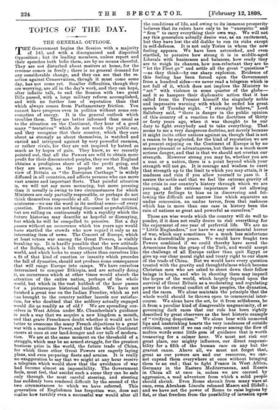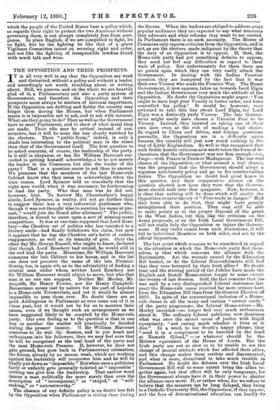TOPICS OF THE DAY.
THE GENERAL OUTLOOK. THE Government begins the Session with a majority of 143, and with a disorganised and dispirited Opposition ; but its leading members, unless report and their speeches both belie them, are by no means cheerful. They are not disturbed about matters at home, for the revenue comes in freely ; there is no general demand for any considerable change, and they can see that the re- action against Conservatism, though it must come some day, has not come yet. Smaller difficulties, though they are worrying, are all in the day's work, and they can hope, after infinite talk, to end the Session with two great Bills passed, with a large military reform accomplished, and with no further loss of reputation than that which always comes from Parliamentary friction. You cannot have progress even in politics without some con- sumption of energy. It is the general outlook which troubles them. They are better informed than usual as to the situation on the Continent, they hear of a good many " tentatives" which do not reach the public ear, and they recognise that their country, which they care about as strongly as about themselves, is watched and envied and intrigued against by very powerful enemies, or rather rivals, for they are not inspired by hatred so much as by hopes of gain. They know, as we recently pointed out, that all the Powers are wild to obtain more profit for their discontented peoples, they see that England obtains a prodigious share of all the profit going, and they are aware, as the people are not, that the view of Britain as " the European Carthage " is widely diffused in all countries, and affects persons who can move vast armies and important fleets. That painful situation is, we will not say more menacing, but more pressing than it usually is owing to two circumstances for which Ministers are only partially responsible, or perhaps do not think themselves responsible at all. One is the unusual acuteness—we use the word in its medical sense—of every question. Events are not being discussed as probabilities, but are rolling on continuously with a rapidity which the future historian may describe as hopeful or dismaying, but which he will be compelled to perceive. Not a day passes without an occurrence which ten years ago would have startled the crowds who now regard it only as an interesting item of news. The Concert of Europe, which at least vetoes war among the Great Powers, is visibly breaking up. It is hardly possible that the new attitude of the Sultan, which is felt throughout the Mussulman world, and which looks to many others than ourselves like a fit of that kind of emotion or insanity which precedes the fall of dynasties, should not produce some consequence that will range Europe into camps. We have ourselves determined to conquer Ethiopia, and are actually doing it, an occurrence which at other times would absorb the itatention of the entire nation, perhaps of the whole world, but which in the vast hubbub of the hour passes for a picturesque historical incident. We have not finished a great war on the Indian Frontier, which as yet f.as brought to the country neither laurels nor satisfac- tion, for who doubted that the soldiery actually engaged would die as readily as of old ? We are spreading our- selves in West Africa under Mr. Chamberlain's guidance in such a way that we acquire a new kingdom a month, and that grave Frenchmen doubt whether it would not be letter to overcome the many French objections to a great war with a maritime Power, and that the whole Continent sneers at once at our land-hunger and our talk of modera- tion. We are at the same moment on the threshold of a struggle, which may be an armed struggle, for the greatest business prize in the world, the future trade of China, for which three other Great Powers are eagerly laying plans, and even preparing fleets and armies. It is really no exaggeration to say that we might at any hour receive a telegram which would show that the avoidance of war had become almost an impossibility. The Government feels, must feel, that amidst such a scene they can be safe only through the most careful steering, and steering has suddenly been rendered difficult by the second of the two circumstances to which we have referred. This generation of Englishmen has forgotten war, does not realise how terribly even a successful war would alter all the conditions of life, and owing to its immense prosperity believes that its rulers have only to be "energetic" and " firm " to carry everything their own way. We will not say this generation actually desire war, as an excitement, but they have lost the old dislike to run its risks except in self-defence. It is not only Tories in whom the new feeling appears. We have been astonished, and even startled, to perceive how strong it is in middle-aged Liberals with businesses and balances, how ready they are to weigh its chances, how non-reluctant they are to. " let the Fleet go " and settle all the great " questions " —as they think—by one sharp explosion. Evidence of this feeling has been forced upon the Government from a hundred sides—we never read a telegram which is not full of it, which does not implore the Ministry to " act " with violence in some quarter of the globe— and it so hampers their diplomatic action that it has. called from the Premier himself the singularly noble and impressive warning with which he ended his great speech of Tuesday night. "I strongly believe," Lord. Salisbury said, " there is danger in the public opinion of this country of a reaction to the doctrines of thirty or forty years ago, when it was thought to be our duty to fight everybody and to take everything. That seems to me a very dangerous doctrine, not merely because it might incite other nations against us, though that is not a reason to be neglected, for the kind of reputation we are at present enjoying on the Continent of Europe is by no- means pleasant or advantageous, but there is a much more serious danger, and that is that we should not overtax our strength. However strong you may be, whether you are a man or a nation, there is a point beyond which your strength will not go. It is courage and wisdom to exert that strength up to the limit to which you may attain, it is madness and ruin if you allow yourself to pass it. I• assure the noble earl that we feel the extreme gravity of the crisis in our country's history through which we are passing, and the extreme importance of not allowing any party feelings to bias us in discovering and fol- lowing the difficult and narrow line which separates an undue concession, an undue terror, from that rashness. which has in more than one case in history been the ruin of nations as great and powerful as ourselves."
Those are wise words which the country will do well to• ponder, if it does not really desire to risk everything for the enjoyment of one year of perfervid life. We are no• " Little Englanders," nor have we any sentimental horror of war, which may sometimes be a much less misfortune than a, discreditable peace. We would have fought two Powers combined if we could thereby have saved the Armenians from the grasp of the Turk, and would accept the challenge of all Europe rather than quit Egypt or give up our clear moral right and treaty right to our share of the trade of China. But we would have every question treated with the gravity and thoughtfulness which become Christian men who are asked to shoot down their fellow beings in heaps, and who in shooting them may imperil the hopes of the world, which largely depend upon the survival of Great Britain as a moderating and regulating power in the eternal conflict of the peoples, the dynasties, and the races. We alone maintain the principle that the whole world should be thrown open to commercial inter- course. We alone have the art, be it from selfishness, be it from a peculiar kind of disagreeable magnanimity, of so governing dark races that our rule has been rightly described by great observers as the best historic example of "vivifying despotism." We alone bear with unmoved lips and unshrinking hearts the very insolences of outside- criticism, content if we can only rescue among the flow of molten words some little gem of guidance that is worth treasuring for a calmer hour. We must not risk our great place, our mighty influence, our direct responsi- bility for a fifth of the human race on any but the gravest cause. Above all, we must not forget that,. great as our powers are and our resources, we can- not expend them everywhere at once without bringing them to an end ; that to fight France in West Africa, Germany in the Eastern Mediterranean, and Russia. in China all at once is, unless we are coerced by aggression, a mad adventure from which a solid people should shrink. Even Rome shrunk from many wars at once, even Abraham Lincoln released Mason and Slidell ; and we have not the power of Rome to raise legions by fiat, or that freedom from the possibility of invasion upon which the people of the United States base a policy which, as regards their right to protect the two Americas without governing them, is not always completely free from arro- gance. In plain English, if we are compelled to fight, let us fight, but let the fighting be like that of a grave Vigilance Committee intent on securing right and order, and not like the fighting of irresponsible rowdies drunk with much talk and wine.







































 Previous page
Previous page